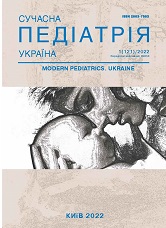Experience of successful surgical treatment of chronic vomiting of rare etiology in a child
DOI:
https://doi.org/10.15574/SP.2022.121.59Keywords:
vomiting, malnutrition, narcotic fetopathy, enteral nutrition, jejunostomyAbstract
Vomiting in children is a common complaint in any health care facility serving children. Usually, vomiting has an organic gastrointestinal or infectious origin, when examining such a patient, it is possible to establish the etiology of vomiting and prescribe etiotropic treatment for recovery. But in rare cases, vomiting can be caused by a rare dysfunction of organs and organ systems that cannot be detected during a comprehensive examination, and its results can vary up to life-threatening.
Clinical case. The article presents a clinical case of successful surgical treatment of a child with chronic vomiting syndrome complicated by stage 3 malnutrition, severe protein-energy deficiency due to narcotic fetopathy, and withdrawal syndrome. The importance of interdisciplinary cooperation, the effect of surgical treatment in a patient with neurological pathology is shown. The effectiveness of the surgical intervention was confirmed by the immediate results of the early postoperative period and follow-up by observing the child for 2 years.
Conclusions. A positive result of treatment demonstrates the effectiveness of interdisciplinary cooperation and a pathogenetic approach to the treatment of a rare form of vomiting due to the impossibility of prescribing etiotropic treatment in this case.
The research was carried out in accordance with the principles of the Helsinki declaration. The informed consent of the patient was obtained for conducting the studies.
No conflict of interest was declared by the authors.
References
Berezhnoi VV, Kozachuk VG. (2016). A new approach in the treatment of infants with functional disorders of the gastrointestinal tract. Sovremennaya pediatriya. 8(80): 116-122. https://doi.org/10.15574/SP.2016.80.116
Drossman DA, Hasler WL. (2016). Rome IV - Functional GI Disorders: Disorders of Gut-Brain Interaction. Gastroenterology. 150 (6): 1257-1261. https://doi.org/10.1053/j.gastro.2016.03.035; PMid:27147121
Halder SL, Locke 3rd GR, Schleck CD et al. (2007). Natural history of functional gastrointestinal disorders: a 12 year longitudinal populationbased study. Gastroenterology. 133: 799-807. https://doi.org/10.1053/j.gastro.2007.06.010; PMid:17678917
Hikita T, Kodama H, Ogita K, Kaneko S, Nakamoto N, Mimaki M. (2016). Cyclic vomiting syndrome in infants and children: a clinical follow-up study. Pediatr Neurol. 57: 29-33. https://doi.org/10.1016/j.pediatrneurol.2016.01.001; PMid:26861170
Pusztaszeri MP, Cryer BL, Genta RM. (2007). Drug-induced injury in the gastrointestinal tract: clinical and pathologic considerations. Nature Clinical Practice Gastroenterology & Hepatology. 4 (7): 442-453. https://doi.org/10.1038/ncpgasthep0896
Shadrin OG, Misnik VP. (2018). Modern possibilities of diet therapy of functional disorders of the gastrointestinal tract in infants. Child health. 13: 3.
Shih AR, Misdraji J. (2017). Drug-induced pathology of the upper gastrointestinal tract. Diagnostic Histopathology. 23 (2): 84-95. https://doi.org/10.1016/j.mpdhp.2017.03.002
Downloads
Published
Issue
Section
License
Copyright (c) 2022 Modern pediatrics. Ukraine

This work is licensed under a Creative Commons Attribution-NonCommercial 4.0 International License.
The policy of the Journal “MODERN PEDIATRICS. UKRAINE” is compatible with the vast majority of funders' of open access and self-archiving policies. The journal provides immediate open access route being convinced that everyone – not only scientists - can benefit from research results, and publishes articles exclusively under open access distribution, with a Creative Commons Attribution-Noncommercial 4.0 international license (СС BY-NC).
Authors transfer the copyright to the Journal “MODERN PEDIATRICS. UKRAINE” when the manuscript is accepted for publication. Authors declare that this manuscript has not been published nor is under simultaneous consideration for publication elsewhere. After publication, the articles become freely available on-line to the public.
Readers have the right to use, distribute, and reproduce articles in any medium, provided the articles and the journal are properly cited.
The use of published materials for commercial purposes is strongly prohibited.

